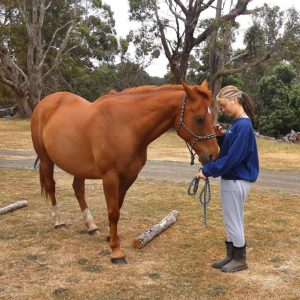A psychotherapist who specializes in helping patients through interactions with horses
Equine-facilitated psychotherapy (EFPT), also known as horse therapy and equine-assisted psychotherapy, is a type of psychotherapy (talk therapy) that makes use of horses as instruments for the purposes of therapeutic healing. Other names for EFPT include horse therapy and equine-assisted psychotherapy. A person is given the opportunity to relive and investigate events from their past with the help of various instruments, props, and other creative ways during this form of experiential therapy.

Hamer Equine Assisted Learning [ H.E.A.L.] offers a tranquil space for participants to experience the unique benefits of equine assisted learning in Victoria, Australia. H.E.A.L. offers physically and psychologically safe experiences with horses.
In most cases, the equine therapist will not suggest solutions but rather provide the individual with a secure environment in which they can reflect on what they observe and how they feel during the session.
This page describes the conditions that horse therapy can treat, as well as the activities that take place during a session with an equine therapist. In addition to that, it delves into the education and licensing requirements necessary to work as an equine-assisted psychotherapist in the field.
Treatments Offered by Equine Therapists
It has been discovered that equine-facilitated psychotherapy is helpful for treating persons who suffer from a range of ailments and/or issues, including the following:
- Disorders on the autism spectrum
- The illness known as attention deficit hyperactivity disorder (ADHD)
- Substance use disorder
- Trauma and post-traumatic stress disorder (PTSD)
- Problems with one’s sense of self-worth, self-awareness, and ability to choose choices
- Concerns relating to one’s mood
- readjusting to life following release from jail or prison
- Depression
- Anxiety
In addition to helping patients learn to trust themselves, equine therapy may also teach them to trust other beings. This is particularly useful for people who are working through the effects of traumatic situations.
Why Go With Horses?
As prey animals, horses are extremely sensitive to their surroundings because of the role they play in the food chain. They are present in the here and now, and they are able to give immediate feedback on the circumstances that they are going through. Because of this, they are an extremely valuable component of the therapy team because they are able to reflect the emotional experience of a patient.
What Kinds of Activities Are Included in Equine Therapy?
In an equine-facilitated psychotherapy (EFPT) session, the client is assisted in working toward their therapeutic goals by a licensed equine therapist as well as a horse professional.
A client may brush, feed, walk, and play games or participate in exercises with one or more horses throughout the course of a typical session. It is possible to provide them with props that will assist them to symbolically process an experience. A customer might, for instance, construct an obstacle course and watch how the horse responds to the various props in the course.
The equine therapist can observe and communicate with the client both during and after the activity in order to discover behavior patterns, as well as to assist the client in processing their thoughts and feelings.
Horses each have their own distinct personalities, and those features can sometimes make people think of themselves or other people in their lives. In certain circumstances, customers may get the impression that they are able to have a relationship with a horse in which they are shielded from criticism and where they feel they can be themselves. In other instances, the horse might represent a person or situation that the person is having trouble overcoming.
In either scenario, the horse has the potential to serve as a medium for the processing and healing of emotions.
The Steps Necessary to Take to Become an Equine Therapist
In order to engage in exercise-based functional movement therapy (EFPT), you are not required to hold any particular independent certification. Nevertheless, in order to engage in the profession of mental health counseling or psychotherapy, an individual must hold the appropriate credentials and be legally qualified to do so in their home state or other applicable jurisdiction.
Some therapists may decide to pursue an optional certification offered by an association of healthcare professionals who specialize in the type of therapy they practice.
The Certification Organization Certification Board for Equine Interaction Professionals (CBEIP) is an independent board that certifies professionals in the fields of mental health and education through the administration of an examination and the evaluation of relevant professional experience.
The CBEIP is not affiliated with any other certification bodies in any way. There are some key requirements that must be met before one may enrol for the exam. The CBEIP does not offer certification for riding teachers or horse specialists.
Through its certification program, the Equine Assisted Growth and Learning Association (EAGALA) confers credentials on individuals who work in the field of mental health as well as those who specialize in horses. A person must successfully finish a training course online, go through an on-site training program, take and pass a test, and submit a professional portfolio before they can become certified.
Summary
Equine-facilitated psychotherapy is an experience form of treatment that can be used to address a wide range of mental health issues. Autism, attention deficit hyperactivity disorder (ADHD), and post-traumatic stress disorder (PTSD) are just a few examples. Clients may interact with one or several horses in a session in a manner that is structured or unstructured, depending on their preferences. An equine therapist works with a client to assist them in processing what it is that they are thinking and experiencing while an equine specialist assists with the handling of the animal or animals involved.